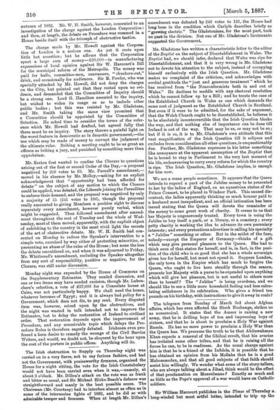Mr. Sexton first wanted to confine the Closure to questions
arising out of the first or second Order of the Day,—a proposal negatived by 209 votes to 83. Mr. Parnell's amendment,— moved in his absence by Mr. Molloy,—asking for an explicit acknowledgment that " opportunity had been afforded for debate" on the subject of any motion to which the Closure could be applied, was debated, the Liberals joining the Parnellites to enforce their demand, and the proposal was negatived by only a majority of 55 (241 votes to 186), though the proposal really amounted to giving Members a positive right to discuss separately every amendment, however purely verbal, which might be suggested. Then followed amendment after amend- ment throughout the rest of Tuesday and the whole of Wed- nesday, most of them moved, apparently, with the explicit object of exhibiting to the country in the most vivid light the secrets of the art of obstructive debate. Mr. W. H. Smith had con- sented on Monday to reduce the Speaker's intervention to a simple veto, exercised by way either of protecting minorities, or preventing an abuse of the rules of the House ; but none the lees the debate smonldered on, and when it was adjourned to Friday, Mr. Whitbread's amendment, excluding the Speaker altogether from any sort of responsibility, positive or negative, for the Closure, was still under discussion.


































 Previous page
Previous page